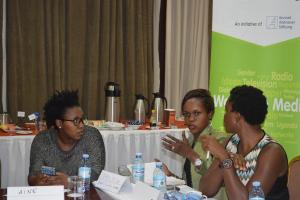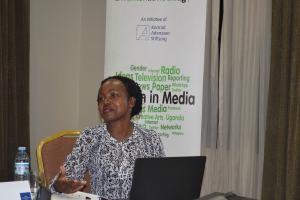Event reports
When looking into the newspapers, sexism and stereotypical images of women can hardly be overseen by any sensitive reader. But to differ between the stereotypes of women and the reality is not always easy and it is hardly unpacked in everyday news packaging and programming. But the media plays a big role in both shaping and continuing social norms and roles. Meaningful changes can therefore only be seen if journalists are well equipped and skilled to identify and counter harmful stereotypes, question what is 'normal' and add new and alternative narratives.
In order to reach this goal KAS facilitated a dialogue titled Unpacking gender (mis-) conceptualization and experience sharing at Protea hotel in Kampala. The session was opened by Rebecca Rwakabukoza who is working as a consultant for the initiative. She explained the goal of more gender-sensitive representation of women in media and explained how the initiative is trying to reach the goal trough smaller dialogues with scholars of gender studies and media people about different topics. This time the selected topic was Sexism in Media. With about 24 mainly female participants working in the media, most of them had a story to share on this issue.
But first, Dr. Florence Ebila senior research fellow at Makerere University and Dr. Sarah Ssali senior lecturer for women and gender studies at Makerere were invited to give some insights on the topic of gender theories and sexism in media. Dr. Florence argued that the concept of gender is very relevant for media or journalist practices: A gender sensitive media could challenge the underrepresentation of women versus men, stereotypical representation of women and men, the kinds of images prevalent in the media and how these influence attitudes and behaviors of readers.
Women and men working in the media should bear in mind that the meaning they put into words enables them to create reality. Therefore women and men should fight against their own and other peoples gender insensitiveness and blindness to reach a point where women are not stereotyped as sexual objects or the weak parts of the society.
The presentation of Dr. Ssali was aimed to illustrate the sexism in everyday media. Sexism in her perception is prejudice, stereotyping, or discrimination, typically against women, on the basis of sex. By showing pictures of women and men presented in newspapers she demonstrates that how stereotypical views of men and women in society are mutually affected by their presentation in the newspapers.
After those very insightful presentations which were accompanied by some specific demands of the male and female participants, the experience sharing round started. The perspectives on sexism and non-sensitive reporting of women were shared by Rachel Mabala and Benon Herbert Oluka.
Benon had to admit, that his reporting and his investigations had been somewhat in-sensitive for stereotypical use of words, as he explained with a specific example where he had been writing about a woman. His article was published although Benon had used some stereotypical attributes of the women had not spoken to her but only had talked to her father about what to write about. As he finished the story, he thanked the scholars and the organizers for inviting him to this event.
Before the discussion started, Rachel Mabala a photo journalist also shared her experiences of sexism in her job. She talked figuratively about the fact that she is always underestimated in her abilities to get good pictures and sometimes even denied to do her job. The fact that she is a woman in a work field dominated by men forces her to work twice as hard as her male colleagues.
She demanded for equal treatment of women in the newsroom and more solidarity of other women in the field of media. The latter point was discussed later on in the open discussion moderated by Rosebell Kagumire. Some participants noted that even women would talk badly about other women and would reproduce the stereotypical often sexist image of females. Besides this, one woman criticized the way some women want to present themselves in the media, when rather talk about neat dresses than their own relevant topics.
Report was compiled by Elena Thie








